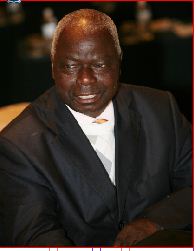
ENGLISH-BORN American author, journalist and literary critic Christopher Hitchens once remarked that there was no country in Africa where it was not essential to know to which tribe, or subgroup of which tribe, the president belongs.
BY NDAMU SANDU
“From this single piece of information you can trace the lines of patronage and allegiance that define the state,” Hitchens said.
Hitchen’s words appeared to be confirmed last week when Energy and Power Development minister Dzikamai Mavhaire appointed Zanu PF politicians and former ministers on parastatals under his wing. Mavhaire appointed former Lands and Rural Resettlement minister Herbert Murerwa to chair the Zesa board.
Former resident minister and governor for Masvingo. Willard Chiwewe landed the chairmanship of the Rural Electrification Agency board.
Zanu PF chairman for Manicaland province John Mvundura and Bulawayo chairperson Callistus Ndlovu were appointed on the boards of the Zimbabwe Electricity Transmission and Distribution Company and Kariba South Hydro Company respectively.
Mavhaire gave a lifeline to losing Zanu PF candidates — Fred Kanzama, Elias Musakwa, Jacob Chademana and Patrick Zhuwawo — who joined the boards of PowerTel, Zesa Enterprises, National Oil Infrastructure Company and Zimbabwe Power Company respectively.
A day earlier, Transport and Infrastructure Development minister Obert Mpofu had appointed former Zimbabwe Mining Development Corporation (ZMDC) board chairman Godwills Masimirembwa to chair the board of the Central Mechanical Engineering Department.
- Chamisa under fire over US$120K donation
- Mavhunga puts DeMbare into Chibuku quarterfinals
- Pension funds bet on Cabora Bassa oilfields
- Councils defy govt fire tender directive
Keep Reading
Masimirembwa’s appointment came four months after President Robert Mugabe had exonerated the Zanu PF losing candidate for Mabvuku-Tafara from allegations of extorting money from a Ghanaian investor.
Last year, President Robert Mugabe accused Masimirembwa, then chairman of the Zimbabwe, Mining Development Corporation, of demanding a US$6 million bribe from William Ato Essien, a Ghanaian investor in the now defunct Gye Nyame Resources in Marange.
But in February, Mugabe made a U-turn and exonerated Masi-mirembwa, saying he had been misled.
Analysts say the appointments of Zanu PF politicians on the boards and retrieving some loyalists from the recycled bin do not engender confidence at a time calls were growing for reforms of state enterprises. The calls for reforms come after revelations that chief executives at these institutions were awarding themselves fat salaries while board members were pacified with huge board fees.
“This is a case of jobs for the boys; especially those that had fallen off the feeding trough. The government is going against its own promises on strengthening the management of state enterprises and to curb corruption as the appointments do not engender confidence,” Rashweat Mukundu said.
“The government is equally telling citizens to go to hell by appointing questionable characters to its state enterprises boards.”
Mukundu said the mere mention of their names, more so their failures in entities they once led, shows the government does not care about public opinion.
“In essence, it’s business as usual and citizens should not expect any reforms but more of the same,” he said.
Former Finance minister Tendai Biti said the appointments confirmed that there was a lack of serious leadership.
“The appointments show total absence of leadership. You need to appoint serious technocrats like engineers to run the boards. To take a bunch of politicians past their sell by dates and who know nothing about energy shows lack of care,” he said.
Biti said President Robert Mugabe was to blame as he was the one that approved the appointments of board members.
Political analyst Phillip Pasirayi said of the appointments: “This is another example of the patronage system whereby public institutions are packed with party loyalists.”
“We should have public institutions run by technocrats who are competent and can turn things around and not party loyalists whose primary concern is serving their party and not the people.” He said Mavhaire should have invited members of the public to submit names, through Parliament, of individuals who are competent and have the skills to run these national institutions.
“There is need for a paradigm shift and the board appointments are one way of strengthening these struggling institutions,” Pasirayi said.
But analyst and academic Ibbo Mandaza said Zesa would tap into Murerwa’s experience gained from being a diplomat, civil servant and minister.
“I can vouch for people like Murerwa. The others, I don’t know them,” Mandaza said.










